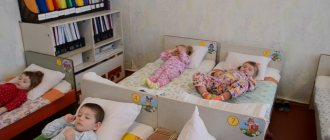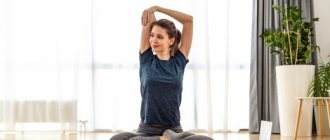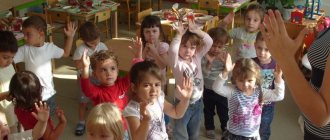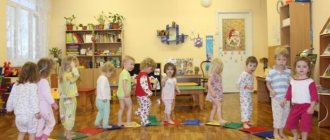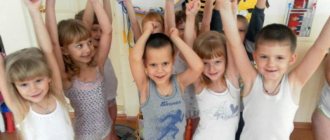Preview:
Summary of gymnastics after sleep for children of the younger group
Duration: 7 min.
Venue: bedroom, group
Teacher preparation: learn the notes, think about the placement of children and equipment, check the equipment, create a hygienic environment.
Children sleep in T-shirts and panties.
Goal: to help children move from sleep to wakefulness
Objectives: gradual awakening of the body to the upcoming activity, raising muscle tone, preventing postural disorders and flat feet, hardening.
Warm up in bed
The sound of calm music, the children wake up.
Exercises in bed:
I. p.: lying on your back. B: hands up, stretch, lower your hands, say: “Wow!”
The composition “The Lonely Shepherd” by Paul Moria is played.
The teacher says in a quiet voice:
On the pillow, on the sheet
Are pink backs tender?
A clear day has come a long time ago
And knocking on our window!
Guys, do you know who came to you while you were sleeping? Our little fox sister has come to visit us! And she really wants us to play with her today.
A fox lives in the forest,
Hands, legs, cheeks, ears love stretching.
We will stretch lightly and wake up slowly.
And now everyone “Stretched and woke up.”
They raised their straight arms together, stretched, then lowered their arms, saying: “Wow!”
I.p. lying down, arms along the body
B: raise your arms up, turn your hands “flashlights”
Summary of gymnastics in the second junior group, author Ershova Irina
Typically, educators use complexes that have a plot basis:
- Educator: “Children, it was interesting to watch you while you were sleeping. Some were snoring like a little kitten, some were stretching in their sleep like a little fox, some were buried in the pillow like a little bear cub. Let’s now use our exercises to depict some animals.”
- Gymnastics complex. "The animals have woken up." I. p. - lying on your back, arms along the body. Yawn and stretch well. Repeat several times; the pace is slow.
- Educator. Guess the riddle: An angry, hungry man walks in the forest in the cold winter. He clicks his teeth! This is gray... (wolf)
- "Welcome to the wolf cubs." I. p. - lying on your back, arms along the body. Bring your hands to your chest, then stretch them forward. Return to i. p. Repeat five times; the pace is moderate.
- "Owl". I. p. - lying on your back, one hand on your stomach, the other on your chest. Drawing in your stomach - inhale, sticking out your stomach - exhale. As you exhale, say “f-f-f-f” loudly. Repeat four times; the pace is slow.
- "Nimble Monkeys" I. p. - lying on your back, arms along the body. At the teacher’s command “tummy”, turn onto your stomach. On the command “back”, turn onto your back. Repeat five times: first moderately, then quickly.
- "Bear cubs growling." Inhale through your nose. As you exhale, pull out “mm-mm-mm-mm,” while simultaneously tapping the wings of your nose with the fingers of both hands.
Organization of awakening in the second junior group
Charging should be planned in advance. If a role-playing game was held in the first half of the day, then thematic awakening gymnastics would be an excellent continuation.
The complex must contain:
- Exercises in bed;
- Vigorous activity (jumping, walking, squats, running);
- Hardening (walking on objects that feel different to the touch (stones, sand), wiping with a cool towel).
Rules for performing game gymnastics
Some rules of gymnastics after a nap:
- The room temperature should not be lower than 16 and higher than 25 degrees.
- To perform the awakening charge, you do not need special clothes or shoes; shorts and a T-shirt are enough.
- Children should not be required to perform assigned exercises. And those who wake up early should be taught self-massage with special balls.
- By time: exercises in bed - no more than 2 minutes, active load - 3 minutes, hardening - 3 minutes.
Gymnastics in the junior group of preschool educational institutions
Card index of awakening gymnastics according to the Federal State Educational Standard
Gymnastics after sleep (junior group 2), card index according to the Federal State Educational Standard:
| Name of exercises | Description |
| "Stretch" | Lying down, while inhaling, stretch your arms up and your legs forward with all your might. |
| "Komarik" | Starting position: on your back, clap your straight arms in front of you, “catching” a mosquito. |
| "Balls" | Jumping near the bed. |
| "Big small" | Starting position: standing. To the word “big” (count “one”), the child straightens up to his full height, to “small” (count “two”) - he crouches and shrinks into a ball. |
| "Kolobok" | Lying on the bed, turn your torso left and right. |
| "Cat - Dog" | Starting position - on all fours. For the word “cat”, arch your back. When pronouncing “doggy”, bend over (you can wag your “tail” - legs crossed behind you). |
| "Bike" | Performed mainly in the summer. Lying on their backs, kids pretend to ride a bicycle with their feet. |
| "Monkeys" | Starting position - on your back, arms bent at the elbows and pressed to the chest. Alternately straighten one hand and then the other, “plucking” bananas from an imaginary tree. |
| "Let's sunbathe on the beach" | Lying on your back, bend your legs alternately towards your chest. |
Exercises in bed and music-rhythm block
The most common combination in awakening gymnastics is poetry, music and the exercises themselves.
Musical-rhythmic block of awakening gymnastics
Here is one of the complexes that can be carried out without lifting the baby from the bed:
- “Stretch” (stretch for 5-10 seconds);
- “Komarik” (clap 5-10 times);
- “Bicycle” (performs for 10-15 seconds);
- “Musicians” (performed to the rhyme):
Educational games for development for 7-year-old children
“We played the harmonica and clapped our hands (the kids clap several times);
Legs - top! top! (stomp on the bed);
Hands - clap! clap! (clap in front of themselves);
And we lower our palms (relax, stretch our arms along the body).
Let's rest."
Types of awakening gymnastics
Different types of gymnastics are designed to solve specific problems. That's why wake-up exercises are so often planned weeks in advance. For example, in the first complex, children warm up exclusively in their beds. The second complex includes active types of exercises, such as jumping and squats.
Types of awakening gymnastics:
- Breathing exercises;
- Musical and rhythmic classes;
- Corrective exercises and complexes (preventing flat feet (walking on mats with different surfaces) or diseases (hardening));
- Exercises with equipment (hoops, balls, etc.);
- Role-playing games;
- Warm up in bed.
In summer, it is recommended to do gymnastics outside in sneakers or Czech shoes. A light warm-up in this case includes running, jumping, squats, walking on massage surfaces and hardening.
Additional Information! All the necessary exercises can be taken from the book by L. I. Penzulaeva “Physical training (for children 3-4 years old).”
Lessons of traditional and non-traditional drawing in kindergarten
Varieties of awakening gymnastics
Gymnastics for waking up after a nap for the first and second junior groups
FROM 1 TO 15 SEPTEMBER
"We woke up"
1. “Happy Hands” - and. p.: lying on your back. Raise your arms to the sides and lower them down. (4 times)
2. “Frisky legs” - and. p.: the same. Alternately lift one leg or the other. (4 times)
3. “Bugs” - and. p.: the same. Rolls to the right, then to the left side. (4-6 times)
4. “Kitties” - and. p.: standing on all fours. Move back and forth, bend down, bending your elbows, returning to the standing position. (4 times)
Walking in place is normal; they leave the bedroom on their toes.
FROM 15 TO 30 SEPTEMBER
"Butterfly"
The flower was sleeping
I.p.: squatting, together under the cheek, eyes closed, head tilted.
And suddenly
I. p. woke up: the same thing.
Slowly open your eyes, lower your arms to your sides, and stand up. Didn’t want to sleep anymore
I. p.: standing.
Turning the head left and right, pointing the finger “I didn’t want to.” He stretched, smiled, soared up and flew.
Children perform movements according to the text. (2-3 times)
FROM OCTOBER 1 TO 15
"Waking the Sun" first part.
1. “The sun is waking up” - I. p.: lying on your back. Raise your head, turn your head left and right. (4 times)
2. “The sun is bathing” - and. p.: the same. Wrap your arms around your knees and roll from side to side. (4 times)
3. “Solar charging” - and. p.: the same, arms extended back. Raise your arms and legs up and forward at the same time. (4 times)
4. “The sun is rising” - and. p.: lying on your stomach, arms bent at the elbows. Rise up onto straight arms without lifting your legs off the bed. (4-5 times)
5. “The sun is high” - and. p.: sitting on your knees, supporting yourself with your hands in front. Rise up onto your hands and straight legs. (4 times)
6. “I am a big sun” - and. p.: standing on your feet near the crib. Raise your arms up to your sides, stretch, stand on your toes. (4 times)
Normal walking barefoot.
FROM OCTOBER 15 TO 31
"Waking the Sun" part two.
1. “That’s how the sun rises” - and. p.: squatting, arms down. Stand up slowly, arms forward and up for each word.
2. “Higher, higher, higher” - and. p.: standing at the top, separated to the sides. Bend your torso down, hands on your knees, return to i. P.
3. “By night the sun will go down” - and. p.: the same. Squat down, lower your arms.
4. “Lower, lower, lower” - and. p.: squatting, arms down. Head tilts down, up and down.
5. “Okay, okay” - and. p.: standing. Clap your hands.
6. “The sun laughs” - i.p.: standing, hands on the belt. Turns the body left and right.
7. “And life is more fun under the sun” - and. p.: the same. Spinning in place in one direction and then in the other direction. (Repeat 2 times)
FROM 1 TO 15 NOVEMBER
"Zainka - little bunny"
1. “Little bunny, cheer up, little gray one, stretch”
I. p.: standing, arms along the body.
Rise up on your toes, arms out to your sides. 2. “Little bunny, turn around, little gray one, turn around”
I. p.: standing, hands on your belt.
Turn the body left and right, then i. p. 3. “Little bunny, dance, little gray, dance”
I. p.: the same.
Soft spring. 4. “Bunny, bow, little gray one, bow.”
I. p.: the same.
Bend the torso forward. 5. “Little bunny, walk around, little gray one, walk around”
I. p.: the same.
Walking in place. 6. “The bunny walked along the bridge”
Walking on a ribbed board.
7. “Yes, over bumps, yes over bumps.”
Walking on rubber mats. 3 floods.
FROM 15 TO 30 NOVEMBER
"Breeze"
1. “Breeze” - and. p.: lying on your stomach, arms along your body. Turn your head to the right, lower your right cheek onto the pillow, then also to the left. Onomatopoeia "fu-u-u".
2. “Flight of the breeze” - i. p.: the same. Spread your arms to the sides.
3. “The breeze is playing” - and. p.: the same, resting your hands on your elbows.
4. “The wind drives the clouds” - and. p.: standing on all fours. Movement of the torso back and forth, without lifting the legs and arms from the crib.
5. “Big gray clouds” - and. p.: the same. Get up onto all fours.
6. “The wind blows across the fields, over forests and gardens” - normal walking turns into a light run.
FROM 1 TO 15 DECEMBER
“Forest adventures” part one.
1. “Bear in the den” - i. p.: lying on your back, arms along the body. Rolls from side to side.
2. “Bunnies - runaways” - and. p.: the same. Alternately lifting legs at a fast pace.
3. “Bunnies are cowards” - and. p.: the same. Bend your legs at the knees, clasp them with your hands - “hide”; return to i. p., move your hands back - “showed up”.
4. “Curious Crows” - and. p.: sitting on your knees. Get on your knees, spread your arms to the sides and make waves, say “car-r.”
5. “Squirrels on branches” - and. p.: standing near the bed, hands on the belt. Turns with a spring.
6. “Noble Deer” - and. p.: the same. Walking in place, raising your knees high.
FROM 15 TO 31 DECEMBER
“Forest Adventures” part two.
1. “Bear in a den” - IP: lying on your back, arms along your body. Rolls from side to side.
2. “Little bunnies” - and. p.: the same. Bend your legs at the knees, clasp them with your hands - “hide”, return to i. p., move your hands back - “showed up”.
3. “The top-gray barrel” - and. p.: standing on all fours. Alternately stretching your legs up.
4. “Fox sisters” - and. p.: standing near the bed. Imitation of the movements of a fox on the spot.
5. “Christmas trees big and small” - and. p.: the same, hands on the belt. Sit down, clasp your knees with your hands, lower your head; then straighten up, stand on your toes, stretch, arms up.
FROM JANUARY 1 TO JANUARY 15
“The Journey of a Snowflake” part one.
1. “Snowflakes wake up” - and. p.: lying on your back, arms along the body. Turns the head left and right.
2. “Snowflakes-fluffs” - and. p.: the same. Spread your arms and legs to the sides, return to standing position.
3. “Snowflakes-ballerinas” - and. p.: standing near the crib, arms to the sides. Torso rotations with wrist rotation.
4. “Snowfall” - i. p.: the same. Slow squats with arms down.
5. “Dance of Snowflakes” - and. n. the same. Spinning in place on your toes.
